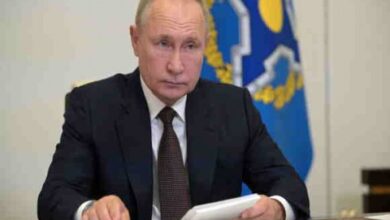I asked to see Ursula von der Leyen’s texts to Pfizer’s boss and she went to court to stop me. Why the secrecy?

Alexander Fanta, The Guardian.
Billions in EU Covid funding have gone unaccounted for. By hiding its business behind personal messaging, Brussels is dodging public scrutiny.
For weeks during the height of the Covid pandemic in early 2021, the European Commission president, Ursula von der Leyen, personally exchanged calls and texts with Albert Bourla, the CEO of the pharmaceutical company Pfizer. Von der Leyen was seeking to secure billions of doses of vaccine.
At the time, the virus was rampant, people were dying and the EU was desperate to catch up with the UK and Israel,which had moved more quickly to procure vaccines. Supplies from Pfizer and AstraZeneca were running low as a result of production issues.
In a frenzied effort to get more Europeans vaccinated, the EU spent an estimated €21.5bn (£17.9bn) on an exclusive deal with Pfizer for up to 1.8bn doses. The deal was secured by Von der Leyen after her text offensive, as she later told the New York Times in a flattering interview. It was a much-needed win for the commission president, who had faced accusations of mishandling the vaccine rollout earlier in the pandemic.
As an investigative reporter, I filed an access request under the EU’s freedom of information law to the messages shared between von der Leyen and Bourla. These messages, if we had them, might provide important insights into how the controversial life-saving vaccines deal came together. They might also help to answer questions such as why the EU became Pfizer’s single biggest customer but reportedly paid a much steeper price for this batch of vaccines compared with the first tranche of Covid shots it had bought.
There is a bigger principle at stake here, too: EU citizens have a right to know what was being negotiated on their behalf during a public health emergency. Did the contract involve too many doses of the vaccine bought at a fixed price, with no scope for a review as the pandemic developed? Did millions of expensive jabs go to waste because of the terms that Bourla secured from a panic-buying Von der Leyen?
But the commission refused the request to share the messages, claiming that the texts were “by [their] nature short-lived” and were not covered by the EU’s freedom of information law. The commission’s secrecy around its communications is so fiercely guarded that it is now defending its refusal to make the texts available in the EU court.
As things stand, any potentially controversial exchanges between EU officials and outside interests, including corporate lobbyists and authoritarian governments, can simply be moved to text or WhatsApp to dodge public scrutiny. To date, no text messages have been stored in the commission’s archives. They are unavailable for scrutiny not only in the present, but are also lost to posterity.
After the commission’s ruling on my request, the New York Times and its former Brussels bureau chief Matina Stevis-Gridneff, who had first reported on the personal diplomacy between Von der Leyen and Bourla, filed a lawsuit to uncover the secret messages.
The EU executive’s legal team claimed in court that the texts were not “substantive” and therefore did not qualify as documents subject to disclosure under the EU’s freedom of information law. At the same time, under questioning by the judges, commission officials admitted they had never actually seen the messages but relied on assurances from Von der Leyen’s staff about their lack of substance. No wonder one exasperated judge called the commission’s testimony “bizarre”.
The commission’s disregard for transparency in this case is no accident. The EU agreed a fund worth €723bn (£600bn) of public money to revive the EU economy after the pandemic. The recovery and resilience facility, unprecedented in EU history, was supposed to finance investments in digital technologies and climate action over six years through grants and loans. But the commission and EU governments have refused to reveal all the beneficiaries to date. When my colleagues at Follow the Money, an investigative media outlet, asked for a breakdown, they reluctantly released the top 100 recipients in each country but left billions in spending unaccounted for.
The secrecy may have provided a cover for suspected cases of abuse. Greek authorities are probing allegations of fraud linked to €2.5bn from the post-Covid recovery fund, while Italian police on behalf of EU prosecutors are investigating another potential fraud case worth €600m.
Requests for information about the spending from other high-profile EU funds have also been denied or delayed for years without explanation.
The EU’s administrative culture – taking its cue from the powerful bureaucracies of its founding members Germany and France – has always been secretive. But under Von der Leyen, things have become worse. Crucial documents are being held back for political reasons by “powerful consiglieri” in Von der Leyen’s cabinet, the outgoing European ombudsman, Emily O’Reilly, has claimed.
Von der Leyen, a German conservative who has led the EU executive for almost five years, has delivered landmark climate legislation and regulation of big tech companies that has drawn the ire of figures such as the X owner, Elon Musk. Von der Leyen portrays herself as a defender against authoritarian forces and, with rightwing parties gaining ground in last year’s European parliament elections, has vowed to strengthen the rule of law in the EU.
However, her reluctance to have the public interfere with her personal communication completely undermines that promise. When her executive appears to flout the rule of law and conducts its most important business in secret, it empowers those who prefer strongman politics to democratic accountability. In the long run, limiting transparency will make it easier for authoritarian leaders such as Hungary’s Viktor Orbán, who have rolled back the rule of law and shroud their own governing in secrecy, to claim that the EU does not have a leg to stand on.
The case before the EU court, which is expected to be decided later this year, could put a limit on Von der Leyen’s secrecy. But other, more forceful measures are needed to fulfil the promise of transparency in the EU’s founding treaties and its charter of fundamental rights. Pressure for more openness must come from the media, civil society organisations and the European parliament.
A complete culture change is needed. EU governments call the shots: they need to remind the EU executive that maintaining public trust means allowing people to understand how key decisions that affect their lives are made, even if such transparency makes governing – and texting – more complicated.





